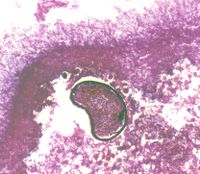Difference between revisions of "Aspergillus spp."
Jump to navigation
Jump to search
| (8 intermediate revisions by 2 users not shown) | |||
| Line 2: | Line 2: | ||
*Common laboratory contaminants | *Common laboratory contaminants | ||
| − | + | [[Image:Aspergillus cleistothecia.jpg|thumb|right|200px|'''Aspergillus cleistothecia''' Professor Andrew N. Rycroft, BSc, PHD, C. Biol.F.I.Biol., FRCPath]] | |
| − | + | ||
| − | |||
*Widely found in nature | *Widely found in nature | ||
**Colonise a wide range of substrates under different environmental conditions | **Colonise a wide range of substrates under different environmental conditions | ||
| Line 14: | Line 13: | ||
**Infection may be acute, chronic or benign | **Infection may be acute, chronic or benign | ||
| − | Produces [[ | + | Produces [[Mycotoxins|Aflatoxin]] |
| + | |||
| + | Causes [[Aspergillosis]] | ||
| + | |||
[[Category:Systemic_Mycoses]] | [[Category:Systemic_Mycoses]] | ||
| + | [[Category:To_Do_-_Fungi]] | ||
Latest revision as of 16:43, 27 July 2010
- Worldwide
- Common laboratory contaminants
- Widely found in nature
- Colonise a wide range of substrates under different environmental conditions
- Abundant in hay, straw and grain which have heated during storage
- Pathogenic species include Aspergillus fumigatus, A. flavus, A. nidulans, A.niger and A. terreus
- May cause primary or secondary disease
- Infection may be acute, chronic or benign
Produces Aflatoxin
Causes Aspergillosis
